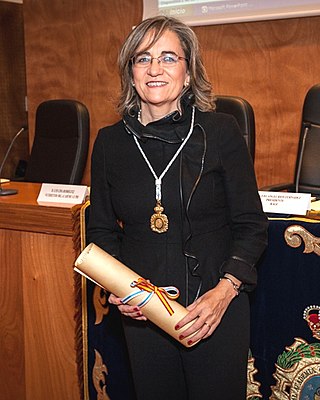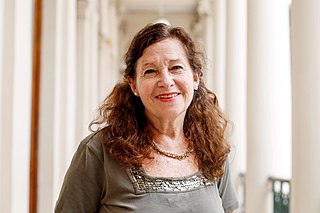Related Research Articles
Sergio Esteban Vélez Peláez is a Colombian writer, professor and journalist. He won the Premio Nacional de Periodismo Simón Bolívar 2010 », the Premio Internacional de Periodismo José María Heredia 2010 .) and the Premio Cipa a la Excelencia Periodística 2012. The poet Olga Elena Mattei says that Vélez represents the Andean aspect of the contemporary Colombian poetry. Vélez is a Communicator of the University of Antioquia, Colombia.

Mario Hamuy is a Chilean Astronomer and Professor of Astronomy at the University of Chile and Cerro Calan Observatory. He is well known for his observational work on all classes of supernovae, especially the use of Type Ia and Type II supernovae as measures of cosmic distance.

Margarita Salas Falgueras, 1st Marchioness of Canero was a Spanish scientist, medical researcher, and author in the fields of biochemistry and molecular genetics. Salas' discovery of the bacterial virus Φ29 DNA polymerase was recognized by the Spanish National Research Council as the highest-grossing patent in Spain. Her cumulative work, as described by The Local in 2019, "invented a faster, simpler and more reliable way to replicate trace amounts of DNA into quantities large enough for full genomic testing."
José Rodríguez Pérez is a Chilean engineer and professor of electrical engineering at the Universidad Andrés Bello.
The Ariel Award for Best Director is an award presented by the Academia Mexicana de Artes y Ciencias Cinematográficas (AMACC) in Mexico. It is given in honor of a film director who has exhibited outstanding directing while working in the Mexican film industry. In 1947, the 1st and 2nd Ariel Awards were held, with Roberto Gavaldón and Emilio "El Indio" Fernández winning for the films La Barraca and Enamorada, respectively. With the exception of the years 1959 to 1971, when the Ariel Awards were suspended, the award has been given annually. Nominees and winners are determined by a committee formed every year consisting of academy members, previous winners and individuals with at least two Ariel nominations; the committee members submit their votes through the official AMACC website.
Ligia Gargallo is a Chilean chemist and university professor of the Pontifical Catholic University of Chile.

María José Alonso Fernandez is a full professor of Biopharmaceutics and Pharmaceutical Technology at the University of Santiago de Compostela. The laboratory she leads is specialized in Pharmaceutical Nanotechnology and Nanomedicine, and her research is oriented to the development of nanostructures for targeted delivery of drugs and vaccines. Her discoveries have led to significant clinical advances in the development of potential new treatments for cancer, ocular diseases, skin diseases, diabetes, obesity and other autoimmune pathologies, as well as new vaccines.

Noemí Elisabet Zaritzky holds a degree in chemical engineering by the Engineering Faculty of the Universidad Nacional de La Plata (1971). In addition, she has a PhD in chemistry from the University of Buenos Aires and is senior lecturer at the Engineering Faculty of the Universidad Nacional de La Plata and the director of the CIDCA.

The Lenka Franulic Award is a Chilean prize, whose purpose is to recognize career achievement in women's journalism. It has been given annually since 1963 by the National Association of Women Journalists of Chile. It is named for Lenka Franulic, the first Chilean woman journalist.
The National Prize of Chile is the collective name given to a set of awards granted by the government of Chile through the Ministry of Education and, as of 2003, by the National Council of Culture and the Arts. They are presented by the President of the Republic at an official ceremony held at La Moneda Palace.
The National Prize for Exact Sciences was created in 1992 as one of the replacements for the National Prize for Sciences under Law 19169. The other two prizes in this same area are for Natural Sciences and Applied Sciences and Technologies.
The National Prize for Natural Sciences was created in 1992 as one of the replacements for the National Prize for Sciences under Law 19169. The other two prizes in this same area are for Exact Sciences and Applied Sciences and Technologies.
The National Prize for Applied and Technological Sciences was created in 1992 as one of the replacements for the National Prize for Sciences under Law 19169. The other two prizes in this same area are for Exact Sciences and Natural Sciences.
The National Prize for Humanities and Social Sciences was created in Chile in 1992 under Law 19169. It is granted "to the humanist, scientist, or academic, who has distinguished himself for his contribution in the field of Human Sciences". The history field has its own National Award.
The National Prize for Musical Arts was created in Chile in 1992 under Law 19169 as one of the replacements of the National Prize of Art. It is granted "to the person who has distinguished himself by his achievements in the respective area of the arts". It is part of the National Prize of Chile.

José María Maza Sancho is a Chilean astronomer and astrophysicist. His work has focused on the study of supernovas, the execution of a search for objects with emission lines, dark energy, and quasars with an objective prism, which led him to be awarded the National Prize for Exact Sciences in 1999.
The National Prize for Medicine was created in 2001 by the Chilean Academy of Medicine, the Association of Medical Faculties, the Association of Medical Scientific Societies, and the Medical College of Chile.

José Aldunate Lyon was a Society of Jesus and Chilean teacher, worker, priest and human rights activist during the military dictatorship. He was awarded the National Prize for Human Rights in 2016.
Sonia Cristina Montecino Aguirre is a Chilean writer and anthropologist. In 2013, she was awarded the Premio Nacional de Humanidades y Ciencias Sociales

Nelly Lucinda Consuelo Meruane Solano was a distinguished Chilean actress and teacher whose career spanned 65 years. For 20 years she was a member of the stable cast of the Teatro Ensayo of the Pontifical Catholic University of Chile.
References
- ↑ El Mostrador Cultura (2019-08-27). "Dora Altbir recibe el Premio Nacional de Ciencias Exactas 2019". El Mostrador (in Spanish). Retrieved 2019-10-08.
- ↑ "Dora Altbir Drullinsky Premio Nacional de Ciencias Exactas 2019". Ministerio de educación. 2019-08-27. Archived from the original on 2019-09-22. Retrieved 2019-10-08.
- ↑ "Dora Rosa Altbir Drullinsky". investigadores.conicyt.cl. Retrieved 2019-10-08.
- ↑ Chile, C. N. N. "Doctora en física Dora Altbir Drullinsky recibe el Premio Nacional de Ciencias Exactas 2019". CNN Chile (in Spanish). Retrieved 2019-10-08.
- ↑ "Dra. Dora Altbir, miembro correspondiente de la Academia, recibió Premio Nacional de Ciencias Exactas" (in Spanish). 2019-08-28. Retrieved 2019-10-09.
| This article about a Chilean scientist is a stub. You can help Wikipedia by expanding it. |
| This article about a physicist is a stub. You can help Wikipedia by expanding it. |